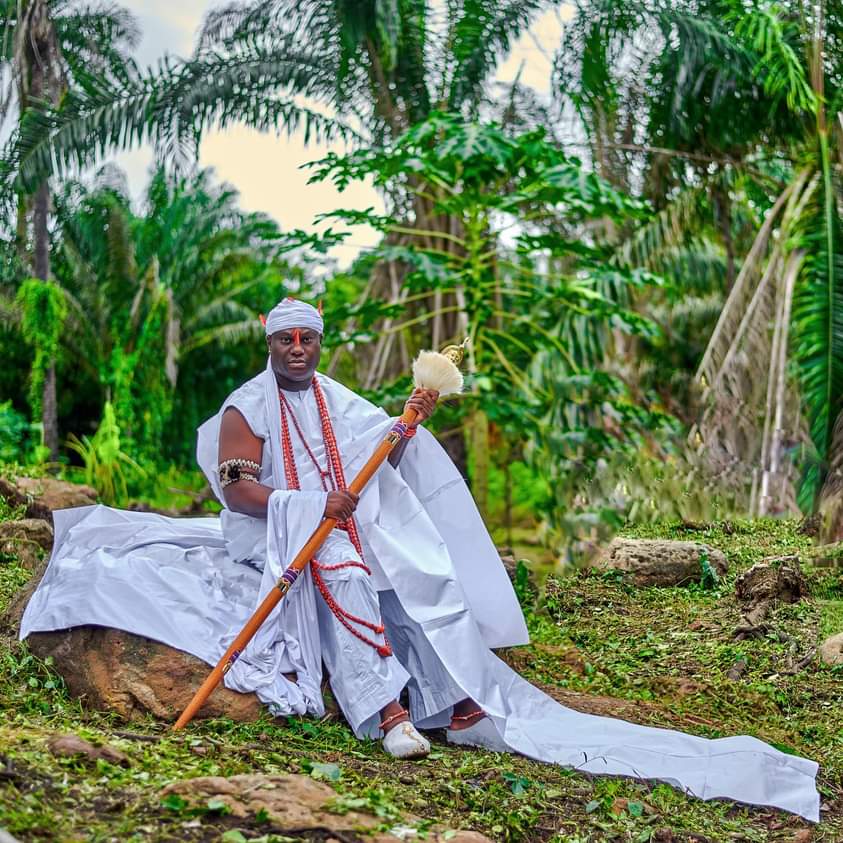Oduduwa, a revered figure in Yoruba mythology, indeed holds a special place in the history of cloth weaving and craftsmanship. His contribution to the development of these art forms spans several centuries and continues to influence the rich tapestry of Yoruba culture to this day.

The concept of cloth weaving that Oduduwa pioneered was deeply inspired by his observations of spiders and their intricate webs. The spider's ability to create delicate yet robust structures served as a profound source of inspiration for Oduduwa. It is said that he marveled at the way spiders intricately wove their webs, and this observation ignited his creativity and imagination.
Beyond the 11th-century expedition, which is often associated with the founding of the Yoruba civilization, the legacy of Oduduwa's craftsmanship endures through various art forms. Yoruba people have excelled in the art of weaving, producing finely crafted textiles that are not only functional but also pieces of artistic expression. The skill and precision passed down through generations have resulted in the creation of stunning fabrics, often adorned with intricate patterns and vibrant colors.
Clothing machine fabrication is another testament to the Yoruba people's dedication to their craft. While modern technology has certainly made this process more efficient, the roots of fabric production can be traced back to the early Yoruba artisans who meticulously crafted textiles by hand. Today, Yoruba fashion designers and artisans continue to blend traditional techniques with contemporary styles, creating garments that bridge the past and the present.
Fashion dexterity is a hallmark of Yoruba culture. The Yoruba people have a long history of creating clothing that not only serves utilitarian purposes but also conveys social status, identity, and personal style. The traditional Yoruba attire, such as the agbada and buba, showcases the intricate embroidery and attention to detail that define Yoruba fashion.
Embroidery proficiencies are another integral part of Yoruba craftsmanship. Yoruba textiles often feature exquisite embroidery work that tells stories, represents symbols, or simply adds beauty to the fabric. This embroidery is a labor-intensive process that requires skill and patience, and it adds a unique touch to Yoruba textiles.
In summary, the legacies left by our Yoruba forebears in the realms of weaving, clothing machine fabrication, fashion dexterity, embroidery, and other related arts are indeed the beacons of our past. They remind us of the rich cultural heritage that has been passed down through the generations. These traditions are also the blessings of our present, as they continue to enrich our lives and provide a deep sense of identity. Finally, they are the precious treasures of our future, as they serve as a source of inspiration for contemporary artists and artisans, ensuring that the legacy of Oduduwa and the Yoruba people's craftsmanship will endure for generations to come.
There is reasonable evidence that this article is machine-generated. Posting such content is considered fraud. Fraud is discouraged by the community and may result in the account being Blacklisted.
Guide: AI-Generated Content = Not Original Content
If you believe this comment is in error, please contact us in #appeals in Discord.
I'll stop bothering you when you send $15 in hive to this account. While you prefer that I send you the link of the posts on Whatsapp or leave them in the comments?